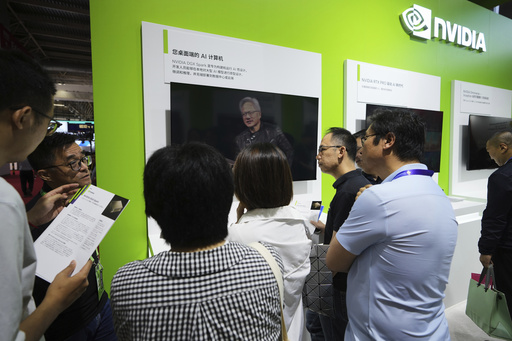Washington—Chinese cyberspace authorities have summoned Nvidia to address security concerns regarding the capability of its H20 chips to be tracked and disabled remotely, as stated by the Cyberspace Administration of China on their website last Thursday. In this meeting, the Chinese regulators demanded detailed explanations from the American chipmaker concerning potential “backdoor safety risks” associated with the H20 chips destined for the Chinese market.
Nvidia responded to the situation by asserting the importance of cybersecurity and clarifying that their chips do not possess any “backdoors” which could allow unauthorized remote access or control. This encounter comes closely following the decision by the former U.S. administration to lift restrictions on Nvidia, enabling the company to recommence selling H20 chips to China, an announcement made by Nvidia’s CEO, Jensen Huang, during a recent visit to Beijing.
This incident signifies ongoing tensions in the technological arena between the United States and China. Businesses in both nations are navigating challenges surrounding market access and national security concerns. A potential safety issue flagged by Beijing might threaten Nvidia’s sales of H20 chips in China. According to U.S. AI experts cited by Chinese regulators, Nvidia is claimed to have developed advanced technologies that enable tracking, locating, and remote disabling of their computing chips, leading to the summons from China to assure the cybersecurity and data security for Chinese consumers.
The situation aligns with a movement from U.S. legislators who have advocated for capabilities to track and locate American advanced chips sold internationally. Earlier this year, Representatives Bill Huizenga and Bill Foster put forward the Chip Security Act, a proposal to mandate security mechanisms in high-end chips to detect illegal activities. Although this bill has stalled, Rep. Foster, drawing on his physics expertise, affirmed the feasibility of using technical solutions to prevent powerful AI from falling into unsuitable hands.
Despite the lifted ban, the U.S. still forbids the sale of its most advanced chips to China, citing the need to maintain a lead in the artificial intelligence race. Nvidia’s H20 chips, designed to meet U.S. restrictions, were initially banned but saw potential sales skyrocket upon the removal of these restrictions. Yet, the decision to ease the ban has stirred significant concern in Congress, with prominent senators, including Senate Minority Leader Chuck Schumer, voicing serious worries to Commerce Secretary Howard Lutnick about the strategic implications.
The senators have emphasized that, although the H20 chips differ in capabilities from Nvidia’s cutting-edge models like the H100, they still provide China with technological advantages unavailable from locally-produced chipsets. This concern was echoed by Rep. John Moolenaar, chair of the House Select Committee on China, who opposed the lifting of the ban and urged the Commerce Department to maintain strict controls. He stressed the need to prevent the potential utilization of American chips by the Chinese Communist Party for military purposes, censorship, and stifling U.S. technological innovation.


